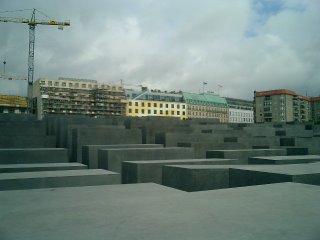I arrived in Copenhagen yesterday. Mr. Supersweetie has been here all summer long, studying furniture design which relates to what he studies at home in NY during the year: interior design. His assignment at the Copenhagen program has been to design and build a chair. Here, in the cradle of modern furniture design!
When I arrived, Mr. S took me to the design school to see the chair he built. It's an armless reading chair with a seat that arcs in a large, wide curve uninterruped down to the floor. The legs are delineated by a little semicircular cutout. It's all veneer except for four brass bolts joining the back panel to the seat. Quite comfortable-- although I'd like to sit and read in it for awhile to see how the body reacts over time. Mr. S is wiped out and dazed from his final week of hard work, but I'm happy to be with him. I've missed him very much.
The apartment he shares with three other students is on the top storey (5th) of a modest building a little north of the city center, in the area around the Kastellet (a park with a military installation in it) and the Amalienborg (the royal palace). The apartment is furnished but simple. Thankfully, the kitchen has all the necessities.
My big adventure this morning was baking some frozen rolls in the oven. The instructions on the wrapping, like on everything else, were only in Swedish, Danish, Norwegian and Finnish. Comprehending about half of the text, thanks to my ability to cross-reference it with the German I know, I resorted to the "cook till it's done" method, which worked just fine.
So, Copey is a very pretty city. Kind of quiet, kind of busy. The streetscapes veer predominantly towards the baroque and later. In the city center, curvy, narrow streets open onto squares frequently so there's a steady rhythm of dense streets and open areas. Canals pop into view here and there. Moving out from the center, the streets are a bit wider and straighter. I'm trying to decide how to describe this city in comparison to others. I guess it's closest to Amsterdam in scale, but with more sizeable buildings. Also more stone and stucco, less naked brick.
I have nothing particular to do, so I'm just walking and looking around. I went into a bunch of churches. Knowing today to be the Feast of the Assumption, I thought a Roman Catholic church might be relied upon to have some sort of big, public mass. But, alas, Denmark is not Portugal, and I found no special celebration scheduled. There's a concert at the Tivoli concert hall tonight with Rolando Villazon -- sold out, of course. I'll go to an organ recital instead.
Must remember to buy toilet paper. Isn't foreign travel exciting?
 Mr. Supersweetie and I went to Berlin, too. Now we're back in New York.
Mr. Supersweetie and I went to Berlin, too. Now we're back in New York.